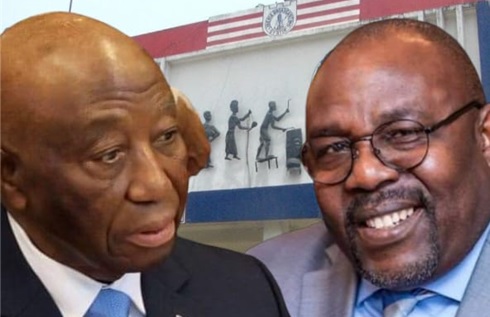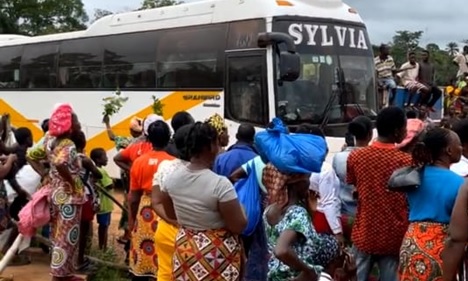MONROVIA – On the second day of the Liberian Government’s 3-day retreat at the Ellen Johnson Sirleaf (EJS) Ministerial Complex in Congo Town, Monrovia, a significant announcement was made that promises to transform Liberia’s infrastructure landscape. Minister of State Without Portfolio, Mamaka Bility, disclosed the arrival of 285 yellow giant-size earth-moving machines intended for road construction projects across the country.
Minister Bility, in her presentation at the retreat, highlighted the strategic deployment of these machines, with each of Liberia’s 15 counties set to receive 19 machines. This allocation aims to ensure an equitable distribution of resources and expedite the road construction process nationwide.
“The introduction of these earth-moving machines marks a critical step in our efforts to improve Liberia’s infrastructure,” Minister Bility stated. “We are committed to enhancing connectivity and accessibility across the country, which will, in turn, spur economic growth and development.”
The procurement of these machines represents a substantial investment in Liberia’s future. It underscores the government’s dedication to addressing one of the nation’s most pressing challenges: the deplorable state of its road network. Poor infrastructure has long been a significant impediment to economic development, affecting everything from trade and agriculture to healthcare and education.
With the deployment of these earth-moving machines, the government aims to initiate a comprehensive road construction and maintenance program. This initiative is expected to create numerous job opportunities, both directly and indirectly, as various sectors will benefit from improved transportation infrastructure.
Minister Bility also highlighted the broader impacts of this initiative. “Improving our road infrastructure will not only facilitate trade and commerce but also enhance access to essential services for our citizens, particularly those in rural areas. This is a vital component of our national development strategy.”
The announcement was met with enthusiasm and optimism by the retreat attendees, who see this as a concrete step towards fulfilling the administration’s promises of infrastructural development and economic revitalization. The retreat, themed “Coordination and Performance, Delivering on the National Agenda,” has focused on reinforcing the President’s agenda, reviewing the administration’s first 100-day performance, and promoting cohesion and coordination within the government.
The allocation of 19 machines per county is designed to ensure that even the most remote areas of Liberia receive the attention they need. This approach reflects the administration’s commitment to inclusive development and equitable resource distribution. The machines will be used for constructing new roads, rehabilitating existing ones, and ensuring that all regions have reliable transportation networks.
Minister Bility’s disclosure comes at a pivotal time, as Liberia continues to recover from years of civil conflict and economic instability. Improved road infrastructure is seen as a cornerstone of national recovery and growth. Better roads will facilitate easier movement of goods and people, reduce transportation costs, and improve access to markets, healthcare, and education.
The deployment of these machines also signifies a move towards self-sufficiency in infrastructure development. By equipping each county with the necessary machinery, the government aims to reduce reliance on external contractors and build local capacity for road construction and maintenance.
As the retreat progresses, further discussions will focus on the implementation plans for this ambitious road construction initiative. The government is expected to outline specific projects, timelines, and monitoring mechanisms to ensure transparency and accountability in the use of these machines.
The unveiling of the 285 earth-moving machines at the Liberian Government’s retreat marks a significant milestone in the country’s development journey. It reflects a strategic commitment to improving infrastructure, fostering economic growth, and enhancing the quality of life for all Liberians. The successful implementation of this initiative will be crucial in achieving the broader goals of the national development agenda and ensuring sustainable progress for future generations.







